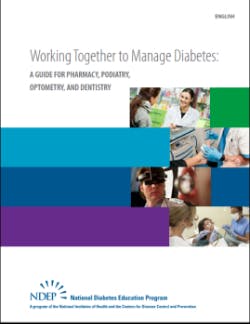By Maria Perno Goldie, RDH, MS
The European Federation of Periodontology (EFP) and the International Diabetes Federation (IDF), in partnership with Sunstar, held a Perio-Diabetes Workshop 2017 in Madrid Spain on February 19-20. This article will review some of the conclusions from the workshop and discuss some of the practical implications of the results.
The Perio-Diabetes Workshop was a small meeting, with only 14 participants, including seven specialists in periodontology from the EFP and seven diabetes experts from the IDF. The experts were charged with exploring the following topics: “the biological tendency of an increased propensity to develop diabetes in patients with periodontal disease; the epidemiological evidence; and the effect of intervention trials on metabolic parameters.”(1)
This meeting was meant to augment already gathered evidence from the 9th European Workshop – Periodontal and Systemic Diseases, which is available online as a special supplement of the Journal of Clinical Periodontology.(2) The articles in the supplement address many issues, such as the three basic mechanisms which have been hypothesized to be factors in the oral-systemic connection: metastatic infections, inflammation and inflammatory injury, and adaptive immunity.(3)
Diabetes is addressed in “Diabetes and periodontal diseases: consensus report of the Joint EFP/AAP Workshop on Periodontitis and Systemic Diseases” and in other articles in the supplement.(4) The other articles review pathogenic mechanisms that may link periodontitis and diabetes, the effect of periodontal disease on diabetes: systematic review of epidemiologic observational evidence, and evidence that periodontal treatment improves diabetes outcomes: a systematic review and meta-analysis.(2)
Researchers’ conclusions
The conclusions of the March 2017 meeting include the following (verbatim):
- “Periodontitis patients have a higher chance of developing pre-diabetes and type-2 diabetes;
- “While there is no data to support a causal relationship between the periodontal microbiome, the microorganisms involved in gum disease, and the presence of diabetes, recent studies do show an association between altered glucose metabolism in pre-diabetes and diabetes and changes in the periodontal microbiome;
- “There is a moderate level of evidence that certain biological mechanisms mediate the effect of periodontitis on the control of diabetes;
- “There is evidence that improving the control of diabetes results in improvements to periodontal status and that improving periodontal health has benefits in improving metabolic control and/or the complications of diabetes.”(5)
““Evaluating the available scientific evidence from both the medical and dental viewpoints has allowed us to develop consensus guidelines on how physicians should evaluate the oral condition of their diabetic patients and how dentists should screen for the risk factors associated with diabetes,” said Prof Sanz. “This is a major step forward towards a more comprehensive care of both diabetic and periodontal patients.”(5)
Guidelines for patients
Part of the charge to the group was to develop guidelines. A section of the guidelines will address the need for patient education.
Patients should be informed of the double-edged sword with diabetes and periodontal disease. If someone has diabetes, it could be a risk factor for periodontal disease. If the oral health issues are not addressed, it could not only effect metabolic control but also other cardiovascular, kidney, and other systemic diseases and conditions. Periodontal treatment has been associated with improvements in glycemic control, with HbA1c reductions of approximately 0.4% reported in systematic reviews and meta-analyses.(6)
However, experts deem that more research is required to investigate this connection further. Another study estimated the effects of periodontal therapy on medical costs and hospitalizations among individuals with diagnosed type 2 diabetes and four other general health conditions.(7) Statistically significant reductions in both outcomes were found for type 2 diabetes after periodontal therapy.
New evidence
The intent of this review was to analyze the effect of periodontal disease on the development of complications in diabetic patients in contrast with periodontal healthy people. The results disclosed that diabetic patients affected by periodontitis had a higher incidence of diabetic complications, such as retinopathy, ophthalmic disease, nephropathy (macroalbuminuria, proteinuria and end-stage renal disease), neuropathic foot ulceration, various cardiovascular diseases, and death due to cardio-renal disease. The authors concluded that periodontal disease is associated to a higher risk of development diabetic complications.(8)
Filippo Graziani is currently recruiting for a clinical study at the University of Pisa titled: Acute-phase Response & Periodontal Treatment in Diabetes Affected Patients (PERIO-DIA).(9) The chief outcome of the study will be the level of C-reactive protein 24 hours after treatment. And lastly, the group reviewed evidence on the potential impact of periodontal therapy on diabetes outcomes, based on an update by Phoebus Madianos of the University of Athens, Greece.
For more informational on diabetes and oral health, visit the National Institute of Dental and Craniofacial Research.(9) There is information for patients in English and Spanish, information for Health Care Professionals, and Clinical Trials.
References
- http://www.efp.org/events/perio-diabetes-workshop/index.html.
- http://onlinelibrary.wiley.com/doi/10.1111/jcpe.2013.40.issue-s14/issuetoc.
- Van Dyke TE, van Winkelhoff AJ. Infection and inflammatory mechanisms. J Clin Periodontol 2013; 40 (suppl. 14): S1–S7. doi: 10.1111/jcpe.12088.
- Chapple ILC , Genco R, and on behalf of working group 2 of the joint EFP/AAP workshop. Diabetes and periodontal diseases: consensus report of the Joint EFP/AAP Workshop on Periodontitis and Systemic Diseases. J Clin Periodontol 2013;40 (suppl. 14): S106–S112. doi: 10.1111/jcpe.12077.
- EFP Press Release March 1, 2017, Madrid, Spain.
- Casanova L, Hughes FJ and Preshaw PM. Diabetes and periodontal disease. BDJ Team 1, Article number: 15007 (2015) doi:10.1038/bdjteam.2015.7. Published online 30 January 2015.
- Jeffcoat MK, Jeffcoat RL, Gladowski PA, Gladowski JB and Blum JJ. Impact of Periodontal Therapy on General Health: Evidence from Insurance Data for Five Systemic Conditions. American Journal of Preventive Medicine, Volume 47, Issue 2, August 2014, Pages 166–174.
- Graziani F, Gennai S, Karapetsa D, and Petrini M. The influence of periodontal disease on the development of diabetic complications. Conference Paper · April 2017. Conference: 24° Congresso Nazionale Collegio dei Docenti Universitari di discipline Odontostomatologiche, At Milan.
- https://clinicaltrials.gov/ct2/show/NCT03087266?term=Acute-phase+Response+%26+Periodontal+Treatment+in+Diabetes+Affected+Patients+%28PERIO-DIA%29&rank=1.
- https://www.nidcr.nih.gov/OralHealth/Topics/Diabetes/.








